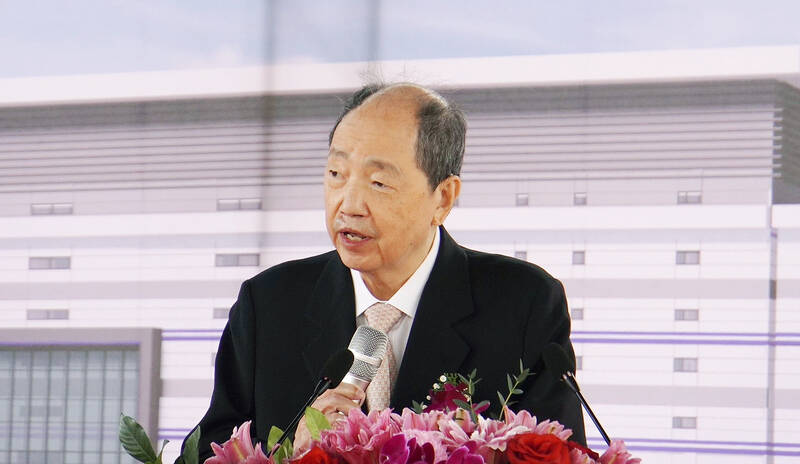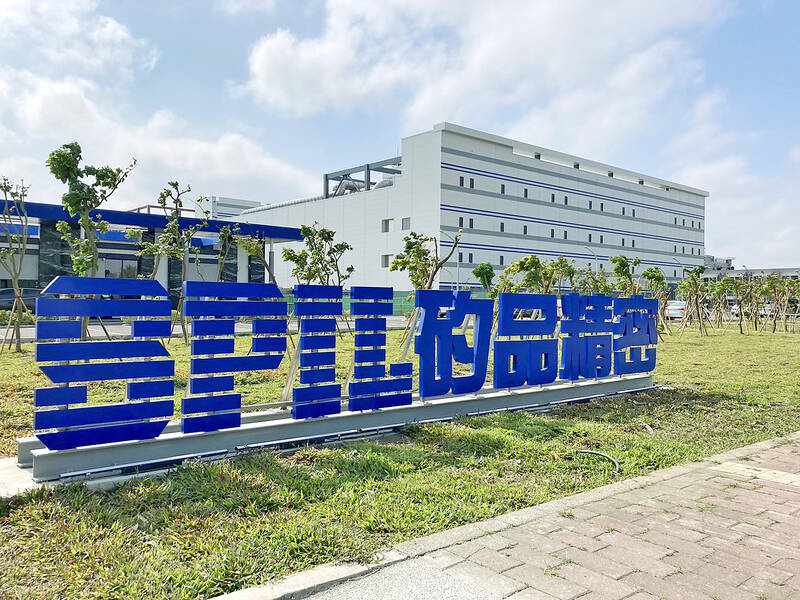Siliconware Precision Industries Co (SPIL, 矽品精密) on Tuesday inaugurated a new factory in Changhua County’s Erlin Township (二林) to meet growing demand for high-end chip testing and packaging services.
SPIL, a subsidiary of ASE Technology Holding Co (日月光投控), said the phase 1 facility is part of the company’s NT$80 billion (US$2.64 billion) capacity expansion program in Erlin over the next eight to 10 years.
The expansion is expected to create 7,000 jobs, it said.

Photo: Yen Hung-chun, Taipei Times
“SPIL continues investing in new factories to get a head start on new growth opportunities,” chairman Tsai Chi-wen (蔡祺文) said, adding that the facility would be “a major step forward in Changhua County’s efforts to encourage semiconductor development.”
Construction of a phase 2 facility would begin soon, Tsai said.
That factory would occupy 14.5 hectares, making it three times larger than its existing plant in the county, SPIL said.

Photo: Yen Hung-chun, Taipei Times
ASE group said it is committed to increasing investment in Taiwan to provide advanced chip testing and packaging services, catering to rising demand for electric vehicles, 5G and high-performance computing-related chips, group chairman Jason Chang (張虔生) said.
The investment also aims to safeguard Taiwan’s leading position in the world’s chip testing and packaging industry, he said.
The nation’s chip industry faces tough challenges and competition in the next 10 years, as countries around the world view semiconductors as a strategically important resource and would heavily subsidize their own buildup, he said.
To protect Taiwan’s competitiveness in semiconductors, Chang said the government should create measures to support recently passed amendments to the Act for Industrial Innovation (產業創新條例).
The amendments stipulate that companies that work to innovate technologies domestically and have a critical role in international supply chains would be granted tax deductions equivalent to the sum of 25 percent of their research and development expenditures and 5 percent of their spending on new equipment acquired for “advanced processes” over a fiscal year.

Taiwan’s exports soared 56 percent year-on-year to an all-time high of US$64.05 billion last month, propelled by surging global demand for artificial intelligence (AI), high-performance computing and cloud service infrastructure, the Ministry of Finance said yesterday. Department of Statistics Director-General Beatrice Tsai (蔡美娜) called the figure an unexpected upside surprise, citing a wave of technology orders from overseas customers alongside the usual year-end shopping season for technology products. Growth is likely to remain strong this month, she said, projecting a 40 percent to 45 percent expansion on an annual basis. The outperformance could prompt the Directorate-General of Budget, Accounting and

Two Chinese chipmakers are attracting strong retail investor demand, buoyed by industry peer Moore Threads Technology Co’s (摩爾線程) stellar debut. The retail portion of MetaX Integrated Circuits (Shanghai) Co’s (上海沐曦) upcoming initial public offering (IPO) was 2,986 times oversubscribed on Friday, according to a filing. Meanwhile, Beijing Onmicro Electronics Co (北京昂瑞微), which makes radio frequency chips, was 2,899 times oversubscribed on Friday, its filing showed. The bids coincided with Moore Threads’ trading debut, which surged 425 percent on Friday after raising 8 billion yuan (US$1.13 billion) on bets that the company could emerge as a viable local competitor to Nvidia

BARRIERS: Gudeng’s chairman said it was unlikely that the US could replicate Taiwan’s science parks in Arizona, given its strict immigration policies and cultural differences Gudeng Precision Industrial Co (家登), which supplies wafer pods to the world’s major semiconductor firms, yesterday said it is in no rush to set up production in the US due to high costs. The company supplies its customers through a warehouse in Arizona jointly operated by TSS Holdings Ltd (德鑫控股), a joint holding of Gudeng and 17 Taiwanese firms in the semiconductor supply chain, including specialty plastic compounds producer Nytex Composites Co (耐特) and automated material handling system supplier Symtek Automation Asia Co (迅得). While the company has long been exploring the feasibility of setting up production in the US to address

OPTION: Uber said it could provide higher pay for batch trips, if incentives for batching is not removed entirely, as the latter would force it to pass on the costs to consumers Uber Technologies Inc yesterday warned that proposed restrictions on batching orders and minimum wages could prompt a NT$20 delivery fee increase in Taiwan, as lower efficiency would drive up costs. Uber CEO Dara Khosrowshahi made the remarks yesterday during his visit to Taiwan. He is on a multileg trip to the region, which includes stops in South Korea and Japan. His visit coincided the release last month of the Ministry of Labor’s draft bill on the delivery sector, which aims to safeguard delivery workers’ rights and improve their welfare. The ministry set the minimum pay for local food delivery drivers at